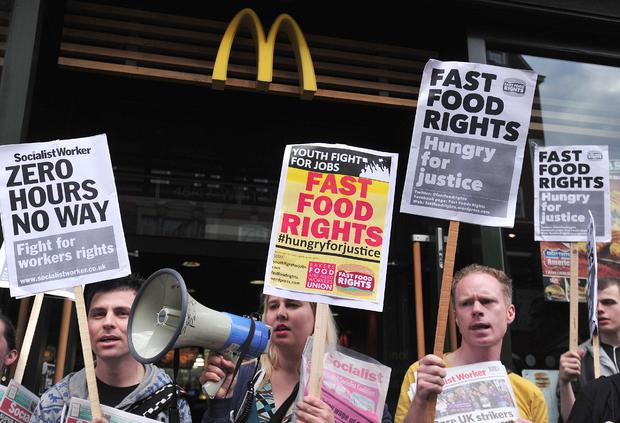Fast-food chains face wave of global protests
In the fight for higher fast-food wages, worker protests are going global.
In what organizers are calling the "biggest strike in fast food history," workers in 150 U.S. cities and in countries from Japan to New Zealand are holding protests today to ask for higher wages. It's a continuation of strikes that gained attention last year over the minimum-wage earnings for many fast-food workers, who are asking for a wage of $15 per hour.
While it may not seem as if the fast-food strikes are paying off -- President Obama's push to raise the federal minimum hourly wage to $10.10 is stalled in Congress -- some say smaller changes offer proof that the protests are having an impact.
Several states this year have increased their minimum wage, including Vermont, which this week approved a $10.50 baseline wage. Meanwhile, public sentiment appears to on the side of workers, with three-quarters of Americans now supporting a higher baseline wage, according to Gallup.
"Cities and states have been raising their minimum wages because communities are waking up to the fact that this is a real problem for their local economies," said Catherine Ruetschlin, policy analyst at Demos, a liberal-leaning think-tank. "That's the direct result of the kind of eye-opening that comes along with people" protesting in front of McDonald's (MCD) and other fast-food restaurants.
With the new round of strikes, fast-food workers staged a "flash-mob" inside a McDonald's in Manila, singing "Let it Go" from the movie "Frozen." The message: The employer should "let go" of low pay, according to the strike organizer. In Brussels, a McDonald's was shutdown at lunchtime by protesters, while demonstrators in Japan earned applause from bystanders. Protests are also being held at U.S. fast-food locations in cities such as Chicago and Milwaukee.
The low-wages of employers such as McDonald's and Burger King (BKW) were cited by Sen. Bernie Sanders (I-Vt.) as an economic problem facing the country. By 2018, Vermont will offer the highest minimum wage of any state in the country, based on legislation that's due to be signed by Gov. Peter Shumlin, a Democrat.
"There is something absolutely perverse when we have taxpayers of this country ... subsidizing Walmart and Burger King and McDonald's," Sanders said on the Ed Schultz show on Wednesday.
One striking McDonald's worker, Daisha Mims, told CBS MoneyWatch that she's dependent on food-stamps and Medicaid to keep her and her three children above water. She started at $7.25 an hour, the minimum wage in Tennessee, and has since boosted her pay to $7.60 an hour, but she says it's not enough.
"I'd like to earn $12 an hour and have a union with benefits, so I'd be secure," Mims said. Asked if she would look for a better-paying job, she said, "These are the jobs that are available. Burger King, McDonald's, they are the only places that are hiring."
Mims's experience highlights a common criticism of low-wage employers in the fast-food and retail industries -- that many of their workers earn poverty-level wages, forcing them to rely on public aid such as food stamps and Medicaid. At the same time, fast-food CEOs are making 1,000 times more than their average worker, according to Demos, making it the most unequal sector in the U.S. economy.
Still, most minimum-wage hikes at state and city levels are all far below the workers' goals for a $15-per-hour wage. Seattle is the only city with a movement to boost the baseline wage to $15 an hour, although that push is being battled by some employers.
"We respect everyone's right to voice an opinion," McDonald's said in a statement emailed to CBS MoneyWatch. "McDonald's respects our employees' right to voice their opinions and to protest lawfully and peacefully. If employees participate in these activities, they are welcomed back and scheduled to work their regular shifts."

